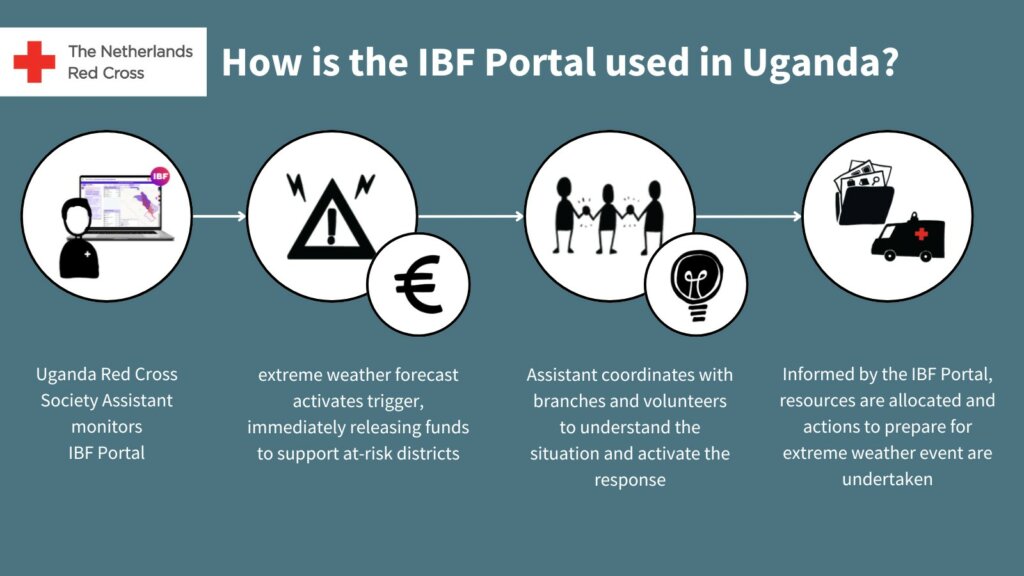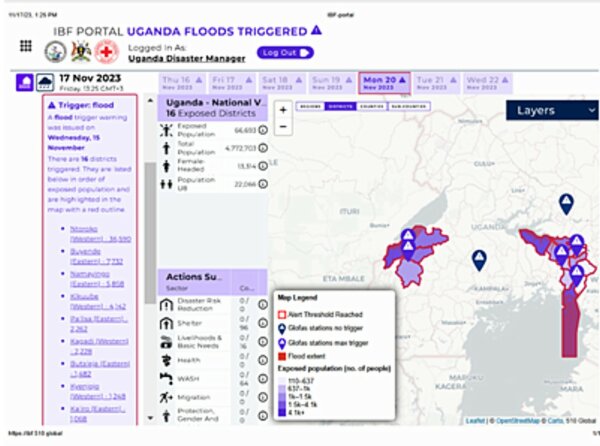إن التحديات التي تواجه القطاع الإنساني اليوم متعددة الأوجه، وتتراوح من الأزمات الصحية إلى زيادة الكوارث الناجمة عن المناخ. وأوغندا ليست غريبة على هذه الظاهرة، مع التعرض المنتظم للفيضانات والجفاف والانهيارات الأرضية والأوبئة التي تفرض ضغوطًا على السكان المحليين والموارد الطبيعية. ولمواجهة هذه التحديات بشكل مباشر، فإن التعاون الفعال أمر ضروري. بتمويل من الشراكة البرمجية between the European Union (EU) and the International Federation of Red Cross and Red Crescent Societies (IFRC), the Uganda Red Cross Society and the Netherlands Red Cross are engaged in a powerful cooperation to accelerate local preparedness for, and responses to, crises in the country.
تعزيز التوطين من خلال الشراكة
لدى الصليب الأحمر الهولندي 12 جمعية وطنية شريكة للصليب الأحمر والهلال الأحمر. يتم تعزيز هذه الشراكات من خلال المكاتب التي تنسق مع الفرق داخل الدولة، فضلاً عن ضمان التوافق والدعم في الوقت المناسب بناءً على الأولويات والاحتياجات المحلية. في سياق الشراكة البرامجية بين الاتحاد الأوروبي والاتحاد الدولي لجمعيات الصليب الأحمر والهلال الأحمر، تعمل جمعية الصليب الأحمر الأوغندي والصليب الأحمر الهولندي معًا لتعزيز عناصر التوطينعندما تقع الكارثة، غالبًا ما يكون الفاعلون المحليون هم المستجيبون الأوائل لأنهم يتمتعون بإمكانية الوصول الحيوية إلى مناطق تقع خارج نطاق الوصول الدولي. ويربط وجودهم المستمر داخل المجتمعات الإغاثة الفورية ببناء القدرة على الصمود على المدى الطويل. وفي إطار حركة الصليب الأحمر والهلال الأحمر، تقود الجمعيات الوطنية تنسيق المساعدات، وتتواصل مع السلطات الوطنية والمنظمات الشريكة. وبناءً على هذا الفهم، تُبذل الجهود لمواءمة أنظمة الاستعداد للكوارث والاستجابة لها على المستويات الوطنية والمحلية والمجتمعية في أوغندا. وتتمحور الشراكة بين الجمعيتين الوطنيتين حول ثلاثة أشكال مختلفة من العمل الإنساني: العمل الاستباقي، والمشاركة المجتمعية والمساءلة، والمساعدة النقدية.
“The Programmatic Partnership brings new questions to the forefront. What does localisation mean, and what does it look like in Uganda? Overall, this programme across multiple countries provides a mirror showing where we can improve at a global level, and highlights opportunities for harmonising localisation.”
Els van Dam, Portfolio Officer at the Netherlands Red Cross’ Uganda Desk
الاستعداد للكوارث مع بوابة IBF
A cornerstone of the collaboration between the two National Societies has been the development and implementation of anticipatory action strategies, leveraging innovative tools such as the Netherlands Red Cross’ بوابة التنبؤ المبني على التأثير (IBF). The IBF Portal is a comprehensive digital platform designed to help disaster managers make timely decisions that save lives. By providing crucial warnings about an impending disaster’s impact, informed by real-time data sources, anticipatory action professionals are empowered to anticipate, mitigate, and respond effectively to evolving extreme weather events, from floods to cyclones and droughts. On top, the portal can pinpoint at-risk infrastructure, facilitating tailored solutions to address the specific challenges and needs of each community. As such, the IBF Portal serves as a critical platform to trigger proactive response measures based on data-driven forecasts.


في أوغندا، تُستخدم بوابة IBF لتقديم تنبيهات قبل حدوث فيضانات كبرى. في نوفمبر 2023، سيتم إطلاق البوابة أدى ذلك إلى تفعيل بروتوكول العمل المبكر (EAP) for the first time in anticipation of heavy rainfall and subsequent floods, launching intervention activities pertaining to shelter, WASH and disaster risk reduction. In recognition of the IBF Portal’s immense potential to save lives and costs in emergency responses, the Uganda Red Cross Society envisions to expand its usage and implement it for more general flood monitoring across multiple thresholds, as well as to complement it with a monitoring mechanism for impending droughts. To implement the National Society’s vision, workshops and discussions together with local government and technical partners and the Netherlands Red Cross have highlighted opportunities to improve the portal’s functionality, such as enhancing data availability and accuracy, and defining thresholds for disaster declaration. This pooling of local expertise and technical input has led to further development of the IBF Portal, based on the priorities and needs of local actors.
“The IBF Portal has helped me as a user to identify high risk areas prone to flooding and likely affected populations, as well as to activate Red Cross teams in carrying out preparedness activities. Across Uganda, affected communities have been able to clear drainage channels and evacuate before hazardous floods hit, reducing impact to houses and averting life loss.”
جويل كيتوتو، مدير مشروع الشراكة البرمجية في جمعية الصليب الأحمر الأوغندي
جعل العمل الإنساني أكثر اعتمادًا على المجتمع والبيانات
The Uganda Red Cross Society further aims to implement a structured approach towards effectively connecting with and responding to communities, in order to collect and act on feedback efficiently, and quicken their response to those in need. In February 2024, the Netherlands Red Cross team undertook a visit to the Uganda Red Cross Society’s headquarters in Kampala to conduct a digital community engagement and accountability workshop which revealed the need for a feedback mechanism to make humanitarian action more community-driven. In recognition of the potential of digital solutions in terms of collecting, storing and visualising data, as well as following up on incoming feedback, the National Society aims to adopt integrated digital tools towards ensuring that community voices are not only heard but also a central part of decision-making processes.
أخيرًا، تتعاون جمعية الصليب الأحمر الأوغندي مع الصليب الأحمر الهولندي في توسيع نطاق المساعدات النقدية الفعالة والآمنة والسريعة من خلال التسليم الرقمي. هنا، قدم فريق الصليب الأحمر الهولندي الدعم الفني لتطوير نظام إدارة معلومات النقد، الذي نفذته وكالة تكنولوجيا المعلومات الأوغندية NITA-U. ومع تقدم طرح هذا النظام، الذي طورته واستضافه أصحاب المصلحة المحليون، يقدم الصليب الأحمر الهولندي المساعدة الفنية المستمرة، مع خطط ملموسة لجمعية الصليب الأحمر الأوغندي لتولي الملكية الوحيدة والحفاظ على النظام بشكل مستقل.
التطلع إلى الأمام
إن التعاون بين جمعية الصليب الأحمر الأوغندي والصليب الأحمر الهولندي يرمز إلى قوة الشراكة في دفع العمل الإنساني المحلي الذي يركز على المجتمع. ومن خلال الاستفادة من الأدوات والاستراتيجيات المبتكرة، مثل منصات المشاركة الرقمية، وأنظمة المساعدة النقدية المبسطة، والتنبؤ القائم على التأثير، فإن كلتا الجمعيتين الوطنيتين في طليعة الاستعداد والاستجابة الاستباقية للكوارث. وبينما يتنقلان عبر التحديات المتعددة الأوجه التي تفرضها الكوارث الناجمة عن المناخ والأزمات الصحية، فإن تفانيهما في التعاون الفعال لا يعمل على تسريع الاستجابات المحلية فحسب، بل يضمن أيضًا بقاء أصوات واحتياجات المجتمعات في بؤرة الاهتمام. وفي المستقبل، فإن الجهود المستمرة لتعزيز وظائف هذه المبادرات ونطاقها، بتوجيه من التعلم المتبادل وتبادل الخبرات، من شأنها أن تعزز العمل المحلي لرفع مستوى السكان المتضررين في أوغندا.
نريد أن نسمع منك!
Are you interested in incorporating any of the products or services mentioned in this case study into your National Society’s or organisation’s work? Please reach out to:
مدير المنتج، بوابة IBF: بليز سيلفان bselvan@redcross.nl
منسق الخدمة، العمل الاستباقي: أكليلو تكلساديك ateklesadik@redcross.nl
مستشار المشاركة المجتمعية والمساءلة: جوناث ليفتوغت jlijftogt@redcross.nl
منسق الخدمة، المساعدة النقدية والقسائم: أنجلينا سافتشوك asavchuk@redcross.nl